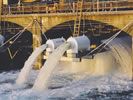Eye For Film >> Movies >> Flow: For Love Of Water (2008) Film Review
Who is controlling the world’s water supplies?
That is the question, or rather one of the questions, posed by this eye-opening film.

First, the question of pollution. Two million children die every year of waterborne diseases. Worldwide, water pollution is a greater threat than Aids or war. In poor communities raw sewage is pumped into rivers, often containing toxic chemical waste, as in the city of La Paz, Bolivia.
In the US, water is contaminated by rocket fuel, released without treatment into rivers and affecting several of the south-western states. Don’t think you can escape by drinking bottled water. These pollutants can enter through your skin when you take a shower. And who monitors the quality of bottled water anyway? The answer is not reassuring.
What this film shows, by visiting communities around the world, is that issues of pollution are often intrinsically linked to issues of ownership. This is the scenario: people need access to clean drinking water. A large multinational company such as Suez or Bechtel promises to install purification plants and pipes to deliver it. But people have to pay for it upfront,often by using a card or token which literally turns on the tap. Many people simply can’t afford it, so are forced to return to using river water, now further polluted by waste from said multinational.
A spokesman for one of these companies points out that while water, like air, is free, if people want it cleaned and piped they have to pay for it. So perhaps this is an issue for government. Unfortunately governments around the world are reaching agreements with the private companies whereby a condition of delivering the clean water is that locally installed systems are turned off, leaving people with no choice.
As water runs out – only 20 years left for California, 10 for New Mexico (busily creating golf courses) – the multinationals buy up water services. So will only the rich be able to afford water?
From Bolivia to South Africa to India there is grassroots opposition, led by some impressively articulate people interviewed in this film. The people of La Paz have succeeded in getting back control of their water supply. In India a small scale UV filtration plant is run by locals to produce affordable water. In Africa, charity installed “playpumps” provide an innovative way of gaining access to water. The answer to lack of water seems to be – small scale is better. Just showing people how to collect rainwater from roofs and store it in basement tanks can make them less dependent on large schemes.
The latter part of the film deals with another rage-inducing issue. In Michigan, Nestle is helping itself to water, which it then bottles and sells making multi-million dollar profits. Despite being taken to court by locals who are losing their supply, Nestle has been allowed to continue, as has Coca Cola in India.
A very engaging film, not without its lighter moments, and one which deserves a wider audience.
Reviewed on: 07 Nov 2008


















